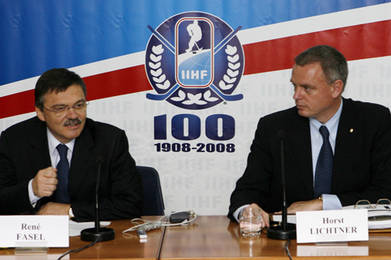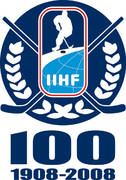

Story #68 Victoria Cup introduced—NHL clubs to face Euro rivalsMay 8, 2007—Moscow, Russia For 35 years or more it had been talked about, but finally in the fall of 2008 the world will see an NHL club team play European club teams in meaningful competition. It is the first of an annual tournament which will showcase full participation between the NHL and the IIHF. The winner will receive the newly-minted Victoria Cup trophy and one million Swiss francs.
This news was delivered by IIHF President René Fasel and IIHF General Secretary Horst Lichtner in a press conference on May 8, 2007, during the World Championship in Moscow. The previous day, when the IIHF announced the press conference and stated that the meeting would carry news “of historic significance”, several media worked almost through the night to break the news prior to the formal announcement, such was the anticipation of the historic association between North America and Europe.
The Canadian Press, Canada’s national news agency, did the best job with their sources, and it ran a story that declared confidently that “NHL clubs will meet European teams”. When the press conference started on May 8, the interview room at Moscow’s Khodynka Arena was full with international media, waiting for the story to be confirmed by the IIHF.
The Victoria Cup tournament will feature the club champion of Europe and an NHL challenger in a format that will be announced sometime in January 2008. The host city for the inaugural event has yet to be determined, and there is certain to be comprehensive television coverage throughout Europe and North America. The event promises to showcase the club-vs.-club competition to a global audience on a scale never before achieved.
The establishing of this tournament is the culmination of decades of competition, ambition, and dreams. After the success of the Summit Series in 1972, the Soviets started to send one or two club teams to North America to play a series of exhibition games against NHL teams during the long, professional season. These tours were successful but also created frustration because too often the NHL teams were squeezing the games in to an already packed schedule and were either too lethargic to play or, as a solution, filled their roster with minor-league replacements to rest their stars.
Nonetheless, teams such as Red Army, Dynamo, and CSKA played games from 1975 up to 1990, and since then NHL teams have increasingly held training camps or played exhibition games in Europe each September. In 1997-98, the NHL opened the regular season in Japan to generate interest in the upcoming Olympics featuring NHL players for the first time, and in 2007-08 the first regular season games were played in London, England at the new O2 Arena.
For hockey lovers and dreamers, the Victoria Cup is the start of something historic. Maybe it will help coax NHL expansion to Europe? Maybe it will be the start of a best-of-seven series between the European champions and the Stanley Cup winners? Or, maybe it will be an annual test which brings the best players from European teams together competing against the best form the NHL. No matter what happens, the hockey lovers around the world are the big winners.
 About the Top 100 Stories As part of the IIHF's 100th anniversary celebrations, www.IIHF.com is featuring the 100 top international hockey stories from the past century (1908-2008). Starting now and continuing through the 2008 IIHF World Championships in Canada, we will bring you approximately three stories a week counting down from Number 100 to Number 11.
The Final Top 10 Countdown will be one of the highlights of the IIHF's Centennial Gala Evening in Quebec City on May 17, the day prior to the Gold Medal Game of the 2008 World Championship.
These are the criteria for inclusion on this list: First, the story has to have had a considerable influence on international hockey. Second, it has to have had either a major immediate impact or a long-lasting significance on the game. Third, although it doesn't necessarily have to be about top players, the story does have to pertain to the highest level of play, notably Olympics, World Championships, and the like. The story can be about a single moment — a goal, a great save, a referee's call — or about an historic event of longer duration — a game, series, tournament, or rule change.
For a Russian translation of this page, please click here.
|
 Click here for the 100 Top Stories
|
|






